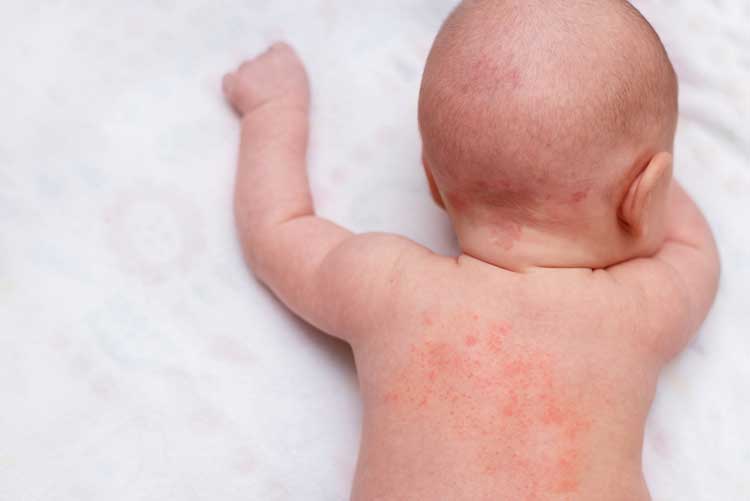Our precious babies deserve the best care each of us can provide. This is particularly important when it comes to their sensitive skin to protect them from irritation, flares and rashes. They also need good established care routines to enable them to develop healthy and supple skin. There are several reasons that cause skin rashes in babies, and they are good indicators to catch a bigger problem in the early stage.
Major Causes of Skin Rashes in Babies
Using a Product That Does Not Suit their Skin
We all love the gentle sweetness of the fragrances used in baby products. But it’s certainly not the best for babies. Each baby’s skin is unique and reacts to different products differently. Fragrances have been proven to be notorious irritants even to adults with sensitive skin, let alone babies. Some additives and certain types of surfactants in body washes also may cause skin irritation. Some tips on choosing products for your precious ones have been mentioned later in the skincare routine below.
Unsuitable Temperature
Babies can tolerate only a small range of temperature. They can get too hot and too cold very quickly. Heat can easily cause red bumpy rashes on their skin. When they are too cold, the skin soon becomes dry and flaky since young children have a lesser capacity to retain moisture in their skin compared to adults.
Moisturizing regularly, dressing them appropriately, paying attention to the environment around them and using the right kind of swaddles and wraps for winters and summers are all helpful in avoiding rashes caused by heat and cold.
Milk Spills, Spit-ups, Sweat or Food Particles on the Skin
It’s not unusual for a nursing child to get milk on their skin, especially during a letdown. Even with a feeding bottle, milk still leaks from the sides of their mouth to their neck.
For younger babies who are unable to move their heads and limbs, it is extremely common to have sweat build-up in their neck folds, elbow folds and behind their knees. These are areas that we miss while cleaning a spit-up as well.
For babies who have started other foods, food smears around the mouth for too long are a major cause of rashes.
📣 Loved what you read? Want to go deeper into conscious parenting? ✨ The Power of Manifestation in Parenting is now available — A soulful guide packed with real-life tools like affirmations, energy shifts, and sleep talk that I personally use with my son, Hitarth. 💛 Start your journey toward calmer, connected parenting today. 🎉 Launch Offer: Only ₹99 (limited-time price!) 📲 Instant download. No waiting. 👉 Grab your copy now!.
After each feeding session, a quick wipe-down with a soft wet wipe or washcloth, a clean-up of their folds of skin once a day and after baths, and washing the baby’s mouth after each meal can prevent the rashes caused by these reasons.
Wearing Dirty Or Wet Diapers For Too Long
As a rule of thumb, dirty diapers must be changed as soon as they are soiled. It doesn’t matter if there’s only very little poop or just a stain in the diaper. They are a breeding ground for germs, and you don’t want your poor baby’s skin to be exposed to that. While each diaper can hold up to several urines passes, you must immediately change a soaking wet diaper. The acid in the urine causes irritation and redness to their genitals, and it can quickly escalate into painful skin rashes in babies.
Timely diaper changes and thorough cleaning between each change is essential to ensure that the baby’s sensitive areas are protected from rashes.
Eczema
Some newborns have crusty, flaky patches on their skin. If the patch is very dry and red, it could be eczema. While most babies outgrow it in a few months, some of them take a few years, and very few carry it into adulthood. Reasons for eczema include genetics, a problem in the skin barrier that retains moisture or exposure to allergens. Check out this blog by a mom & her experiences about dealing with Eczema on her baby.
Some babies are allergic to dairy, peanuts, eggs and other foods, and this is often manifested through rashes on their skin. Even if the baby is exclusively breastfeeding, it is possible that they are exposed to these through the mother’s diet. Some baby formulas also contain ingredients that your baby may not be able to tolerate.
For breastfed babies, mommy can try an elimination diet to understand which food is intolerant for the baby. For formula-fed babies, try different brands and milk solids-free variants until you find one that is suitable for your little one. Also, make sure to moisturize their skin often. Plenty of products specially formulated for eczemic skin is available in the market. Also, read here 7 Foods to Avoid in Babies and Toddlers with Eczema.
Skin Care Tips To include As a Routine for Supple and Healthy Skin in Babies.
- Moisturize at least twice a day and always after bath.
- Use fragrance-free products where possible, especially for children with sensitive skin or severe rashes.
- Mild surfactant products for body washes and shampoos. Cocamidopropyl betaine and coco-glucoside are two common mild substitutes for sulfate surfactants.
- Diaper cream application after each diaper change can work wonders to prevent rashes by creating a barrier on the skin surface against moisture.
- Pat dry after baths and washes instead of rubbing to prevent irritation.
- Pay attention to fabrics using only natural, breathable fabrics (preferably cotton) for all of the child’s clothes, muslins, cloth diaper inserts and washcloths.
- Hydrocortisone is an over-the-counter ointment available for rash treatment. Make sure to buy the composition suggested for infants and consult your paediatrician for use directions, as longer use of the product has other side effects.
- Sun Dry clothes and bedding. This helps protect the little ones against insect bites that might have crawled into these fabrics.
Final Words
It’s not unusual for babies to develop skin rashes, but immediate intervention can prevent further exacerbation. Proper treatment at the right time allows better healing, and good habits and routines to care for their skin help prevent rashes and other irritations to a large extent. If the problem persists, do not delay seeking medical attention.
Your comments and shares do more than just support our blog—they uplift the amazing moms who share their stories here. Please scroll down to the end of the page to leave your thoughts, and use the buttons just below this line to share. Your support makes a big difference!



